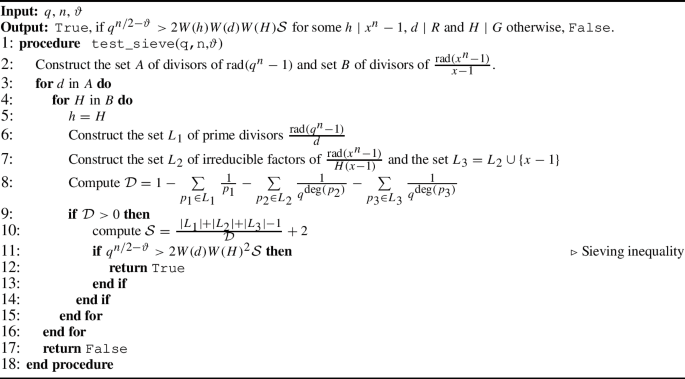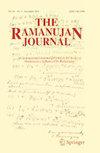有限域上r-原始k-正规元的逆
IF 0.7
3区 数学
Q3 MATHEMATICS
引用次数: 1
摘要
本文研究了有限域$$\mathbb {F}_{q^n}$$中元素$$\alpha $$的存在性,使得$$\alpha $$及其逆$$\alpha ^{-1}$$在$$\mathbb {F}_q$$上均为r原元和k正态。我们定义了k-正规元集合的特征函数,并利用它建立了期望对$$(\alpha ,\alpha ^{-1})$$存在的充分条件。此外,我们发现对于$$n\ge 7$$,在$$\mathbb {F}_{q^n}$$ / $$\mathbb {F}_q$$中总是存在一对1基元和1法元$$(\alpha ,\alpha ^{-1})$$。另外,我们得到对于$$n=5,6$$,如果$$\textrm{gcd}(q,n)=1$$,除了字段$$\mathbb {F}_{4^5}$$之外,$$\mathbb {F}_{q^n}$$中总是存在这样的一对。本文章由计算机程序翻译,如有差异,请以英文原文为准。

Inverses of r-primitive k-normal elements over finite fields
This article studies the existence of elements $$\alpha $$ in finite fields $$\mathbb {F}_{q^n}$$ such that both $$\alpha $$ and its inverse $$\alpha ^{-1}$$ are r-primitive and k-normal over $$\mathbb {F}_q$$ . We define a characteristic function for the set of k-normal elements and use it to establish a sufficient condition for the existence of the desired pair $$(\alpha ,\alpha ^{-1})$$ . Moreover, we find that for $$n\ge 7$$ , there always exists a pair $$(\alpha ,\alpha ^{-1})$$ of 1-primitive and 1-normal elements in $$\mathbb {F}_{q^n}$$ over $$\mathbb {F}_q$$ . Additionally, we obtain that for $$n=5,6$$ , if $$\textrm{gcd}(q,n)=1$$ , there always exists such a pair in $$\mathbb {F}_{q^n}$$ , except for the field $$\mathbb {F}_{4^5}$$ .
求助全文
通过发布文献求助,成功后即可免费获取论文全文。
去求助
来源期刊

Ramanujan Journal
数学-数学
CiteScore
1.40
自引率
14.30%
发文量
133
审稿时长
6-12 weeks
期刊介绍:
The Ramanujan Journal publishes original papers of the highest quality in all areas of mathematics influenced by Srinivasa Ramanujan. His remarkable discoveries have made a great impact on several branches of mathematics, revealing deep and fundamental connections.
The following prioritized listing of topics of interest to the journal is not intended to be exclusive but to demonstrate the editorial policy of attracting papers which represent a broad range of interest:
Hyper-geometric and basic hyper-geometric series (q-series) * Partitions, compositions and combinatory analysis * Circle method and asymptotic formulae * Mock theta functions * Elliptic and theta functions * Modular forms and automorphic functions * Special functions and definite integrals * Continued fractions * Diophantine analysis including irrationality and transcendence * Number theory * Fourier analysis with applications to number theory * Connections between Lie algebras and q-series.
 求助内容:
求助内容: 应助结果提醒方式:
应助结果提醒方式:


